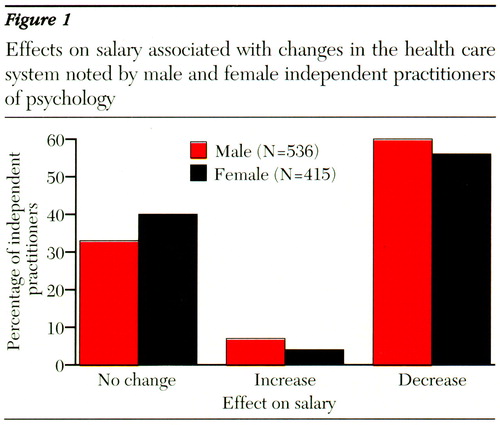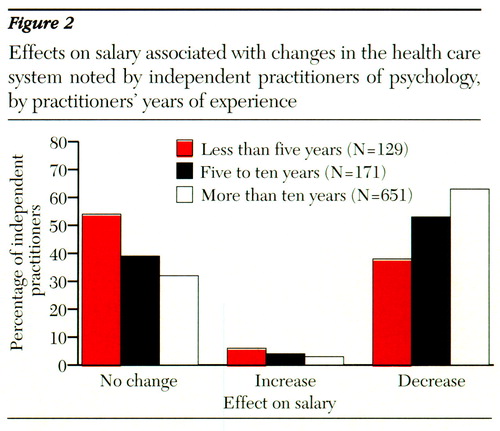Datapoints: Salary Changes Among Psychologists by Gender and Years of Work
Data from the 1997 American Psychological Association (APA) salary survey were analyzed to examine changes in salaries, in relation to gender and years of work experience, resulting from health care system reform.
The 1997 survey was sent to a stratified random sample of 20,000 members of the association. The overall response rate was 42 percent, with men and women almost equally represented (52 percent and 48 percent, respectively). A total of 951 independent practitioners of psychology—licensed, doctoral-level clinical, counseling, and school psychologists—responded to the survey question about salary shifts associated with changes in the health care system.
Among the respondents, 60 percent of the men (N=322) and 56 percent of the women (N=232) reported a decrease in salary from the previous year (Figure 1). The average percentage decrease was 17 percent for men and 18 percent for women. One-third of the men indicated no change in salary, compared with 40 percent of the women. Only very small percentages indicated salary increases.
A direct relationship was found between the years of work experience and the likelihood of a decrease in salary (Figure 2). Reductions were reported by 38 percent of the practitioners with less than five years' experience (N=49) and by 63 percent of those with more than ten years' experience (N=411). This relationship was also evident in 1995 (2). Practitioners who had worked for more than ten years were least likely to report salary increases. Fifty-four percent of the practitioners with less than five years' experience (N=70) reported no change in salary, compared with 39 percent with five to ten years' experience (N=67) and 32 percent with more than ten years' experience (N=209).
Compared with 1995, higher proportions of practitioners reported in 1997 that their salaries had been affected negatively by health care reform. The number of practitioners with a salary reduction increased by 14 percent between 1995 and 1997 among practitioners with less than five years' experience and by 7 percent among practitioners with more than five years' experience.
Dr. Williams is acting director of the research office of the American Psychological Association, where Dr. Kohout is director and Ms. Wicherski is a research consultant. Send correspondence to Dr. Kohout, APA Research Office, 750 First Street, N.E., Washington, D.C. 20002. Harold Alan Pincus, M.D., and Terri L. Tanielian, M.A., are coeditors of this column.

Figure 1. Effects on salary associated with changes in the health care system noted by male and female independent practitioners of psychology

Figure 2. Effects on salary associated with changes in the health care system noted by independent practitioners of psychology, by practitioners' years of experience
1. Williams S, Kohout JL, Wicherski M: Changes in salaries of independent practitioners of psychology. Psychiatric Services 49:1020, 1998Link, Google Scholar
2. Kohout JL, Wicherski M: Changes in psychologists' salaries. Psychiatric Services 48:467, 1997Link, Google Scholar



